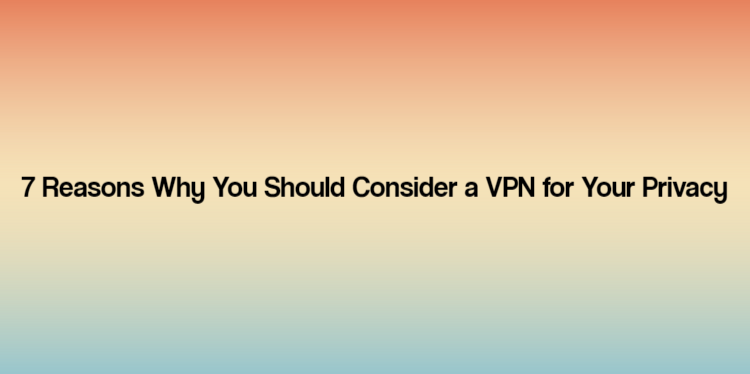Page Contents
7 Reasons Why You Should Consider a VPN for Your Privacy
A virtual private network, or VPN, is a secure connection method that enhances the privacy and security of your online browsing. A VPN conceals your public IP address by routing the connection through the VPN server rather than public servers. As a result, a different IP address location provided by the VPN takes your place.

VPNs encapsulate all online data transfers using cutting-edge encryption protocols and secure tunneling technologies. They won’t be able to interpret anything from your actions, even in the unlikely event that a hacker gains access to your network. Threats from the outside are shielded from your information.
Access to the Internet safely from anywhere.
VPNs offer secure connections from anywhere. You can access your VPN from any location and on any device or operating system through a secure username and password. A VPN allows you to access the Internet safely from any location, including airports, hotels, coffee shops, and other public spaces. Since you have a secure connection of your own, you can browse the web without worrying about using a public WiFi network.
Your information is kept from the government.
Your browsing history would be completely private in an ideal world. The information wouldn’t be accessible to outside sources or the government. Unfortunately, that is not the case. Whether we agree or not, the government collects much information about and monitors Internet users. Virtual private networks (VPNs) help protect your data from the government and other sources because their encrypted connection makes your Internet activity and traffic much harder to track.
VPNs bypass network censorship to access restricted websites.
Some websites or online services may be blocked in your country or region. Sites may be blocked by your employer or school as well. You can switch locations (IP addresses) with a VPN to access the content from wherever you need to be.
Additionally, a VPN enables you to access streaming services from other nations without hindering your Internet speed or running the risk of watching on a dubious website. To get American viewers onto Netflix Australia, for instance, so they can access all the programs unavailable in the United States. Players can also access games from other nations. You can safely get around geo-blocking with a VPN.
When not in secure areas or sites, it offers safety.
When using a VPN, you can feel secure entering information online, even when using public or suspected WiFi. End-to-end encryption provided by a VPN protects your online activities, data, and privacy regardless of where you are. Hackers on the same WiFi network can easily intercept your connection if you don’t use a virtual private network.
Compatible with smart technology
VPN services are not only compatible with computers. Go to the app store on your phone to find out what VPN options are available. You can typically install a VPN service that protects your device, though each VPN provider will have varying capacities to cover phones and other smart devices. VPN apps offer the same protection on the go and encrypt your data just like desktop VPNs do.
Shop online and find better deals
Online sales and prices are driving up the popularity of this practice and its convenience for consumers. Prices for some items, substantial items like airline tickets, hotel stays, or subscription services, can change depending on where you live. You can alter your IP address with a VPN to access the best deals.
VPNs limit the data accessibility of apps.
There are more data collectors than just the government and your computer. Additionally, mobile apps on devices gather user data. Because a VPN prevents apps from connecting your online activity to your computer’s IP address, the amount of precise data an app can collect is constrained.
Frequently Asked Questions (FAQ)
Has anyone ever been charged with a crime for using a VPN?
True, but this is unusual. In a few instances, Chinese internet censors have tried to impede access to VPN services and their websites. Additionally, the UAE has issued warnings to VPN users.
Most recently, two websites in Denmark were taken offline, and their owners were detained for disseminating instructions on how to use Popcorn Time, an illegal streaming service. The websites also offered instructions for using VPNs.
Are there any legal ramifications to using a VPN?
Unless you live in a country that has expressly prohibited the technology, using a VPN will not get you in trouble with the law. It is possible to engage in illegal activity when using a VPN, just as with a stable connection.
Some VPN services ensure that no fraudulent or illegal activity occurs on their network. This could include writing down your initial IP address and the one you connect to, and the timestamps for when you log in and out. A VPN rarely logs or tracks the websites you visit. The logging policy of a VPN should continually be reviewed before use.